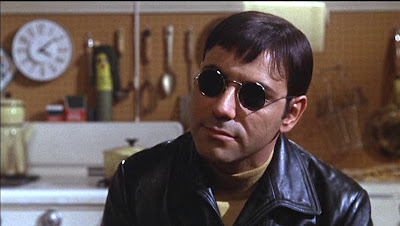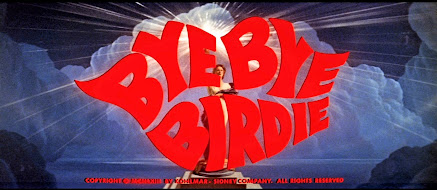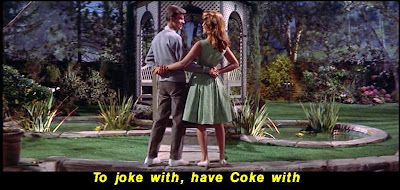The musical biopic, as a genre, is one that has grown so homogeneous and formulaic over the years, even films I’m seeing
for the first time have a sense of déjà vu about them. Irrespective of the subject or its title - The Helen Morgan Story, I’ll Cry Tomorrow, Funny Girl, Star!, or Lady Sings The Blues - these films hew so closely to a standard Hollywood rags-to-riches soap opera blueprint that their basis in biographical fact matters, at
most, only tangentially.
 |
| Doris Day as Ruth Etting |
 |
| James Cagney as Martin (Moe the Gimp) Snyder |
 |
| Cameron Mitchell as Johnny Alderman |
America’s perverse love/hate relationship with celebrity demands that our glorification of wealth and notoriety never be rewarded with stories about famous people who are actually happy. In the end, it always seems as if our innate puritanism gets the better of us, allowing only for the depiction of stardom as a fundamentally empty, joyless kind of ambition. A goal fraught with heartache and awash with tears behind the tinsel.
Love Me or Leave Me follows a similar course, but distinguishes itself by making the road it takes toward its anticipated comforting conclusion one of the bitterest and bumpiest I've ever encountered in an MGM musical.
If queried about its track record of making biographical films that bear little to no resemblance to the actual lives of their subjects, Hollywood’s response would most likely be along the lines of: “If you want facts, go see a documentary!” And indeed, dramatic interest and entertainment value always triumph over truth in movie bios. And so it goes with Love Me or Leave Me, the reasonably accurate (read: mostly made-up ) story of Ruth Etting, popular jazz singing star of the '20s and '30s.
 |
| During the 1920s and '30s, Ruth Etting gained fame as "America's Radio Sweetheart" and "America's Sweetheart of Song." |
When we first meet Ruth Etting (Doris Day), it’s the 1920s, and she’s working as a taxi dancer in a seedy Chicago dime-a-dance dive that’s being squeezed by small-time racketeer Marty Snyder (James Cagney). Recognizing an opportunity for exploitation when he sees one, Snyder attempts to put a squeeze of another sort on the spunky, well-put-together Etting after she's sacked for defending herself against the physical advances of an over-ardent customer. In a romantic song-and-dance as old as Herod and as topical as an episode of Judge Judy; Snyder hopes to curry the favor of Etting through the gracious bestowing of a lot of strings-attached assistance. Although initially apprehensive, Ruth, a woman not unfamiliar with bread and knowing upon which side hers is buttered, soon finds herself the begrudging recipient of the diminutive mobster’s largesse. (That sentence reads smuttier than perhaps intended.)
In spite of an awareness of Snyder's increasingly possessive actions on her behalf being motivated by a romantic interest she cannot return, Etting—the nakedly opportunistic possessor of both a burning ambition to be a singer and a moral compass desperately in need of adjustment—nevertheless permits the gangster to bankroll and promote her career while she strings him along. Not exactly a problem until continued success incites in the songstress a longing for independence that increases in direct proportion to Snyder’s obsessive need to control her every waking moment. Further fanning the flames of discontent is the ongoing flirtation between Etting and onetime on-the-Snyder-payroll pianist, Johnny Alderman (Cameron Mitchell). Yes, for a brief period, both Etting and Alderman are being paid by Snyder while making goo-goo eyes at one another behind his back. A mobster, an opportunist, and a double-crosser: what a lovable cast of characters!
That I even enjoyed spending time in the company of three such largely unsympathetic and self-interested individuals is a testament to the irreproachable charm of both Doris Day and James Cagney; the tuneful score of period standards made famous by Etting; and the obfuscating dexterity of Daniel Fuchs Oscar-winning story and Isobel Lennart’s (Funny Girl) Oscar-nominated screenplay.
WHAT I LOVE ABOUT
THIS FILM
If the above statement gives the impression that I’m less than thrilled
by Love Me or Leave Me’s somewhat
flinty cast of characters, let me clarify that nothing could be further from
the truth. On the contrary, the hard-bitten characterizations and refreshingly cynical
tone of Love Me or Leave Me place it
far beyond the pale of your typical, sentimental, MGM musical fare. And by me,
that is just fine. I truly love movie musicals, but a rarely-discussed downside
to this pop-cultural predilection of mine is how frequently I'm forced to endure the
most cloyingly false and saccharine plotlines just to get to the singing
and dancing. Love Me or Leave Me is
such an atypically dark depiction of ambition and obsessive love that one immediately senses that there is no way a film this sordid would ever be green-lighted were it not purportedly
based on true events.
Succeeding where Martin Scorsese’s not-dissimilar New York, New York failed, Love Me or Leave Me finds the humanity behind its hard-boiled characters and delivers a solid musical drama that takes an unflinching look at the kind of relationship that is doubtless more common in show business than we're usually shown. It all makes for a remarkably gripping viewing experience as anticipated romantic clinches and cliches are dashed left and right by characters with scarcely a sentimental bone in their bodies. Chiefly due to the powerhouse performances of Doris Day & James Cagney, what might otherwise be abhorrently unpleasant material becomes truly compelling human drama. Marred only by the occasional lapse into perhaps Production Code-mandated, tacked-on morality.
 |
| Doris Day has had just about enough of your shit. |
Succeeding where Martin Scorsese’s not-dissimilar New York, New York failed, Love Me or Leave Me finds the humanity behind its hard-boiled characters and delivers a solid musical drama that takes an unflinching look at the kind of relationship that is doubtless more common in show business than we're usually shown. It all makes for a remarkably gripping viewing experience as anticipated romantic clinches and cliches are dashed left and right by characters with scarcely a sentimental bone in their bodies. Chiefly due to the powerhouse performances of Doris Day & James Cagney, what might otherwise be abhorrently unpleasant material becomes truly compelling human drama. Marred only by the occasional lapse into perhaps Production Code-mandated, tacked-on morality.
PERFORMANCES
If you’re a fan of the extensive catalog of mobsters, hoods, and mugs that made James Cagney one of the biggest stars at Warner Bros. in the '30s & '40s, then his performance in Love Me or Leave Me might feel like a late-career “best of” reprisal of the kind of roles he near-copyrighted in his heyday (Cagney was 55 at the time). Fair enough. For Cagney doesn't do a lot here that he hasn't done before. But whether his pugnacious, poignantly lovesick Moe the Gimp is your first or fiftieth exposure to James Cagney onscreen, there’s no getting past the fact that the man kicks serious ass. Looking very much throughout the film like a fist with eyes, Cagney—whether combative, funny, wounded, or monstrous—is such a magnetic, menacing, and dynamic a presence, you literally can’t take your eyes off of him.
I’m a Doris Day fan from way back. But unlike most, my least favorite films of hers are those so-called sophisticated sex comedies she made with that interchangeably bland lineup of lantern-jawed stiffs: Rock Hudson, Rod Taylor, and James Garner. I know I’m alone in this, but I've always felt Doris Day—an actress of untapped versatility and an effortless appeal that made her considerable talent all too easy to dismiss—was sabotaged throughout her career by always being paired with handsome-but-dull leading men. Doris had a lot more danger and sex behind that million-dollar smile than she was ever able (or willing) to take advantage of, but in Love Me or Leave Me, she more than rises to the occasion.
She delivers what is, to me, the best performance of her career and meets Cagney’s intensity head-to-head. She drinks, she's tough, she fires off her hard-bitten dialogue as if to the manner born, and she's one helluva crier (her sobs are so body-wracking they break your heart). There’s no way to look at her work here and not wish she had ventured into more dramatic roles in her career. (Perhaps the story is apocryphal, but if it’s true Doris Day was offered the role of Mrs. Robinson in The Graduate, based on her performance here, more's the pity she didn't accept it.)
THE STUFF OF FANTASY
Lest one begin to think Love Me or Leave Me is nothing but a lot of sturm und drang, rest assured that things are enlivened considerably by a passel of songs Doris Day gets to sing and dance to (quite marvelously, I might add). Although the songs are period-perfect, the arrangements are strictly 1950s, and Ms. Day sounds absolutely nothing like Ruth Etting, which is all to the better since she looks nothing like her either. Day is in fine voice, and for once, her spectacular figure is shown off to full advantage...in a series of sexy, form-fitting gowns totally wrong for the 1920s, but who's complaining?THE STUFF OF DREAMS
Tossing aside any need for Love Me or Leave Me to actually be a historically/narratively accurate biography of Ruth Etting (If you must, you can see and hear her on YouTube, and read her considerably seamier story online), I have to say that I have nothing but praise for this film. In fact, I admire it a great deal and consider it to be one of the best of the overworked musical biopic genre. It isn't often that a mere musical offers up so gloomy a portrait of obsession, or showcases characters of such ambiguously complex motives and attachments.
Love Me or Leave Me's old-school, MGM gloss is considerable, but there's a maturity to the whole enterprise that more than makes up for the film's occasional adherence to by-the-numbers movie bio plotting. In a way that feels very contemporary now but must have been jarring in 1955, Love Me or Leave Me maneuvers its tricky shifts in tone expertly. The songs never bring the story to a halt and the drama always feels honest (sometimes brutally so) to the characters.
Of course, what brings me back to Love Me or Leave Me time and time again are the performances of Doris Day and James Cagney. Who would ever guess that Doris Day could be so rivetingly sexy playing sullen and cynical? And as for Cagney...well, they don't make 'em like him anymore. A polished diamond in the rough if there ever was one.
Love Me or Leave Me's old-school, MGM gloss is considerable, but there's a maturity to the whole enterprise that more than makes up for the film's occasional adherence to by-the-numbers movie bio plotting. In a way that feels very contemporary now but must have been jarring in 1955, Love Me or Leave Me maneuvers its tricky shifts in tone expertly. The songs never bring the story to a halt and the drama always feels honest (sometimes brutally so) to the characters.
Of course, what brings me back to Love Me or Leave Me time and time again are the performances of Doris Day and James Cagney. Who would ever guess that Doris Day could be so rivetingly sexy playing sullen and cynical? And as for Cagney...well, they don't make 'em like him anymore. A polished diamond in the rough if there ever was one.
Clip from "Love Me or Leave Me" 1955
Copyright © Ken Anderson (2009 - 2013)



























.JPG)




































